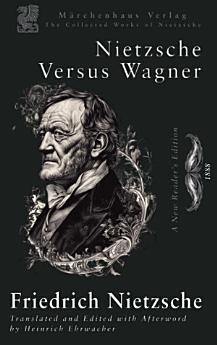Nietzsche versus Wagner
May 2024 · The Collected Works of Friedrich Nietzsche Aklat 38 · Marchen Press
E-book
123
Mga Page
family_home
Kwalipikado
info
reportHindi na-verify ang mga rating at review Matuto Pa
Tungkol sa ebook na ito
"Nietzsche versus Wagner", sometimes translated "Nietzsche against Wagner", is a critical examination of the composer Richard Wagner, whom Nietzsche praised in his early years and later declared his enemy. Nietzsche was close to the entire Wagner family, even Wagner's wives, but later had a falling out and spent a significant amount of energy attacking him. In this work, Nietzsche distances himself from Wagner's music and ideology, criticizing the composer's embrace of German nationalism and his turn to Christianity. Nietzsche contrasts Wagner's decadent, pessimistic art with his own vision of a life-affirming, Dionysian aesthetic. The book reflects Nietzsche's broader concerns about the role of art and culture in society and his ongoing exploration of the tensions between Apollonian and Dionysian forces. Nietzsche also addresses the psychological and philosophical implications of Wagner's music, arguing that it represents a retreat from the complexities of reality into the comforting illusions of myth and religion. He sees Wagner's work as symptomatic of a broader cultural malaise characterized by a loss of vitality and authenticity. Through his critique of Wagner, Nietzsche seeks to reaffirm the values of individualism, creativity, and the joyful affirmation of life that he believes are essential to the rejuvenation of culture and the realization of human potential. This is one of three major works attacking Wager's music and legacy Nietzsche issued. This work was assembled and published at the end of 1888 under the title Nietzsche contra Wagner, shortly before his final mental collapse in January 1889. The text was published in December 1888 by C. G. Naumann in Leipzig. This modern critical reader's edition offers a clear and accessible translation of Nietzsche’s original manuscript, using contemporary language and streamlined sentence structures to make his complex ideas easier to engage with. Designed for both general readers and students of philosophy, the edition includes a range of supporting materials to provide context and deepen understanding. These include an afterword by the translator discussing the historical reception and intellectual legacy of the work, an index of key philosophical concepts with emphasis on Existentialism and Phenomenology, a chronological list of Nietzsche’s published works, and a detailed timeline of his life, highlighting the personal relationships that influenced his thinking.
Tungkol sa may-akda
Friedrich Nietzsche (1844-1900) was a watershed German philosopher, cultural critic, poet, musician (briefly) and philologist (the study of ancient manuscripts) whose work has had a profound impact on modern intellectual history. Known for his critiques of European morality and religion (particularly Protestantism), Nietzsche's ideas on the "will to power" and the "Übermensch" have influenced a wide range of philosophical, literary, and psychological thought including thinkers such as Martin Heidegger, Albert Camus, Michael Foucault and the entire Postmodern religion.
I-rate ang e-book na ito
Ipalaam sa amin ang iyong opinyon.
Impormasyon sa pagbabasa
Mga smartphone at tablet
I-install ang Google Play Books app para sa Android at iPad/iPhone. Awtomatiko itong nagsi-sync sa account mo at nagbibigay-daan sa iyong magbasa online o offline nasaan ka man.
Mga laptop at computer
Maaari kang makinig sa mga audiobook na binili sa Google Play gamit ang web browser ng iyong computer.
Mga eReader at iba pang mga device
Para magbasa tungkol sa mga e-ink device gaya ng mga Kobo eReader, kakailanganin mong mag-download ng file at ilipat ito sa iyong device. Sundin ang mga detalyadong tagubilin sa Help Center para mailipat ang mga file sa mga sinusuportahang eReader.











